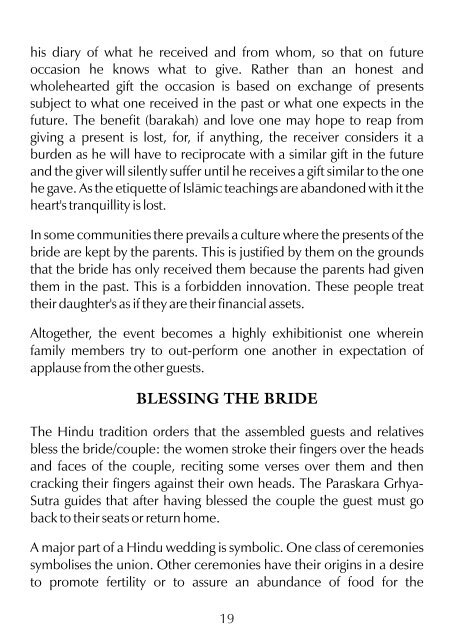You also want an ePaper? Increase the reach of your titles
YUMPU automatically turns print PDFs into web optimized ePapers that Google loves.
his diary of what he received and from whom, so that on future<br />
occasion he knows what <strong>to</strong> give. Ra<strong>the</strong>r than an honest and<br />
wholehearted gift <strong>the</strong> occasion is based on exchange of presents<br />
subject <strong>to</strong> what one received in <strong>the</strong> past or what one expects in <strong>the</strong><br />
future. The benefit (barakah) and love one may hope <strong>to</strong> reap from<br />
giving a present is lost, for, if anything, <strong>the</strong> receiver considers it a<br />
burden as he will have <strong>to</strong> reciprocate with a similar gift in <strong>the</strong> future<br />
and <strong>the</strong> giver will silently suffer until he receives a gift similar <strong>to</strong> <strong>the</strong> one<br />
he gave. As <strong>the</strong> etiquette of Isl\mic teachings are abandoned with it <strong>the</strong><br />
heart's tranquillity is lost.<br />
In some communities <strong>the</strong>re prevails a culture where <strong>the</strong> presents of <strong>the</strong><br />
bride are kept by <strong>the</strong> parents. This is justified by <strong>the</strong>m on <strong>the</strong> grounds<br />
that <strong>the</strong> bride has only received <strong>the</strong>m because <strong>the</strong> parents had given<br />
<strong>the</strong>m in <strong>the</strong> past. This is a forbidden innovation. These people treat<br />
<strong>the</strong>ir daughter's as if <strong>the</strong>y are <strong>the</strong>ir financial assets.<br />
Al<strong>to</strong>ge<strong>the</strong>r, <strong>the</strong> event becomes a highly exhibitionist one wherein<br />
family members try <strong>to</strong> out-perform one ano<strong>the</strong>r in expectation of<br />
applause from <strong>the</strong> o<strong>the</strong>r guests.<br />
BLESSING THE BRIDE<br />
The Hindu tradition orders that <strong>the</strong> assembled guests and relatives<br />
bless <strong>the</strong> bride/couple: <strong>the</strong> women stroke <strong>the</strong>ir fingers over <strong>the</strong> heads<br />
and faces of <strong>the</strong> couple, reciting some verses over <strong>the</strong>m and <strong>the</strong>n<br />
cracking <strong>the</strong>ir fingers against <strong>the</strong>ir own heads. The Paraskara Grhya-<br />
Sutra guides that after having blessed <strong>the</strong> couple <strong>the</strong> guest must go<br />
back <strong>to</strong> <strong>the</strong>ir seats or return home.<br />
A major part of a Hindu wedding is symbolic. One class of ceremonies<br />
symbolises <strong>the</strong> union. O<strong>the</strong>r ceremonies have <strong>the</strong>ir origins in a desire<br />
<strong>to</strong> promote fertility or <strong>to</strong> assure an abundance of food for <strong>the</strong><br />
19














